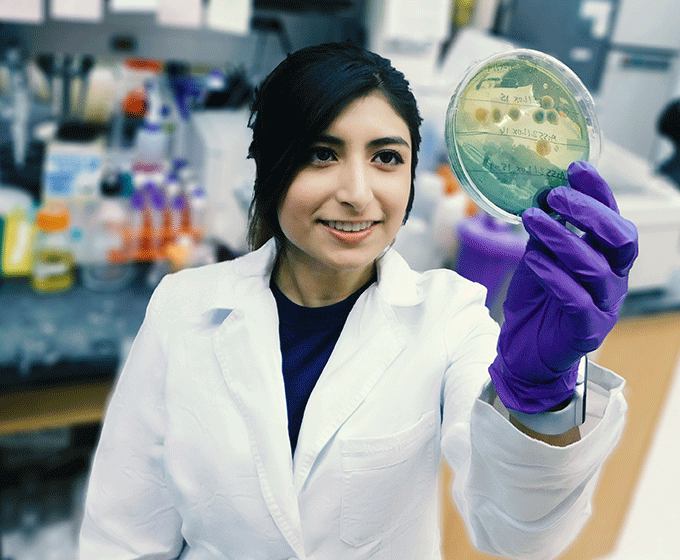
Mylea Echazarreta Cristner is a UTSA doctoral student studying cell and molecular biology.
MARCH 1, 2022 — The UTSA College of Sciences’ Department of Molecular Microbiology and Immunology (MMI) will launch a new Ph.D. program in molecular microbiology and immunology beginning this fall to address the critical workforce shortage locally, statewide and nationally of specialists in immunology and infectious diseases.
“Our faculty are committed to educating, mentoring and sponsoring the next generation of scientists while addressing the demand for more professionals with Ph.D. degrees,” said MMI Department Chair Astrid Cardona. “With the shortage of infectious diseases and immunology specialists, one of the program's goals is to meet the workforce needs of academia and industries specialized in biotechnology, biodefense and health care—in San Antonio, in Texas and beyond.”
“This program offers a structured degree plan designed to maximize student engagement in cutting-edge research methodologies,” added Janakiram Seshu, UTSA professor and graduate advisor of record for the MMI department. “Our goal is to prepare doctoral-level scientists to meet the current and emerging challenges in the field of microbiology and immunology.”
The MMI Ph.D. will be UTSA’s 27th doctoral program, supporting the university’s recent designation as a Tier One institution dedicated to launching large-scale research initiatives that gain the university national and international recognition. These initiatives are increasing UTSA’s annual research expenditures, which is key to increasing the pipeline and success of its doctoral students and supporting the recruitment and retention of nationally recognized faculty members.
By 2028, UTSA expects to have $300 million in annual research expenditures, $55 million in restricted research expenditures and 15 faculty members in the National Academies.
“UTSA has been designated as a Top Tier research university,” Cardona said. “MMI doctoral trainees will work closely with faculty in a highly collaborative environment in one of the most productive research departments at UTSA.”
Faculty from a wide range of research areas will provide instruction, research-based training and mentoring in several areas of microbiology and immunology, including autoimmune diseases, vaccine design, biodefense and drug development. Students will conduct research in the department’s laboratories, as well as those at the Texas Biomedical Research Institute and the San Antonio Military Medical Center.
Program applicants must meet the graduate admission requirements listed in the UTSA Graduate Catalog and hold a bachelor’s or master’s degree in science from an accredited institution in biology, microbiology, biochemistry, biotechnology, molecular biology or a related discipline. An overall GPA of 3.0 or higher is required to apply.
Full-time students accepted to the program are eligible for financial support, including research assistantships or fellowships. Students also will receive financial support from UTSA, including $28,000 a year plus payment of all tuition and fees and reimbursement for health insurance.
UTSA Today is produced by University Communications and Marketing, the official news source of The University of Texas at San Antonio. Send your feedback to news@utsa.edu. Keep up-to-date on UTSA news by visiting UTSA Today. Connect with UTSA online at Facebook, Twitter, Youtube and Instagram.
Late Night at the Rec is an awesome UTSA tradition that turns a typical information session into an exciting night of fun. It's a unique opportunity to meet new people and reconnect with old friends.
Campus RecreationCheer on the UTSA Soccer team as they take on Lamar in the first home game of the season.
Park West FieldShow your UTSA pride with our spirited crew—Rowdy, Cheer, the Spirits of the Roadrunner, and the incredible Spirit of San Antonio Marching Band (SOSA)—as we light up the night in true Roadrunner style.
Main Campus East Lawn, Main CampusAnnual Giving will host a First Day of School celebration to welcome students back to campus. We will have giveaways and photo opportunities.
Sombrilla Plaza, Main CampusEnjoy snacks while connecting with Adobe reps and student ambassadors. Download or log into the Adobe Express app to snag swag and unlock exclusive back-to-school templates. It’s a fun, fast way to get creative and start the school year with bold moves.
Central Plaza, Main CampusCelebrate the merger of UTSA and UT Health San Antonio with a pop-up featuring free t-shirts, exclusive swag, and interactive photo opportunities. Open to all students, faculty and staff. Supplies are limited!
Sombrilla Plaza, Main CampusHuddle Against Hunger is a fundraising competition with Texas State that benefits our Roadrunner Pantry. Donations this week will help UTSA earn additional prize monies provided by RBFCU.
In-Person and VirtualThe University of Texas at San Antonio is dedicated to the advancement of knowledge through research and discovery, teaching and learning, community engagement and public service. As an institution of access and excellence, UTSA embraces multicultural traditions and serves as a center for intellectual and creative resources as well as a catalyst for socioeconomic development and the commercialization of intellectual property - for Texas, the nation and the world.
To be a premier public research university, providing access to educational excellence and preparing citizen leaders for the global environment.
We encourage an environment of dialogue and discovery, where integrity, excellence, respect, collaboration and innovation are fostered.